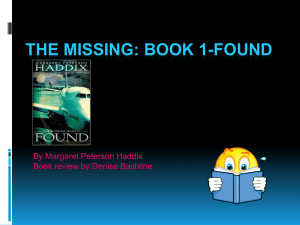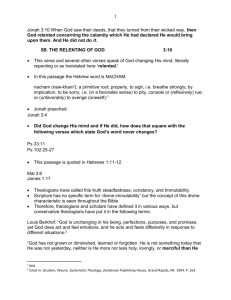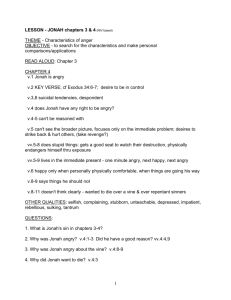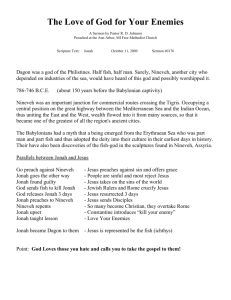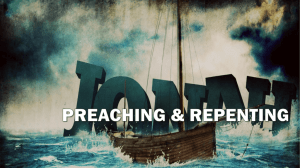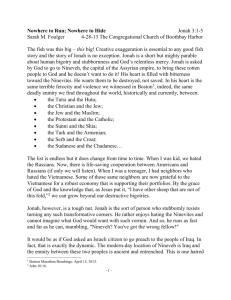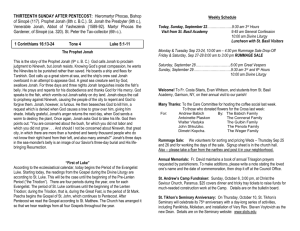Jonah 4
advertisement
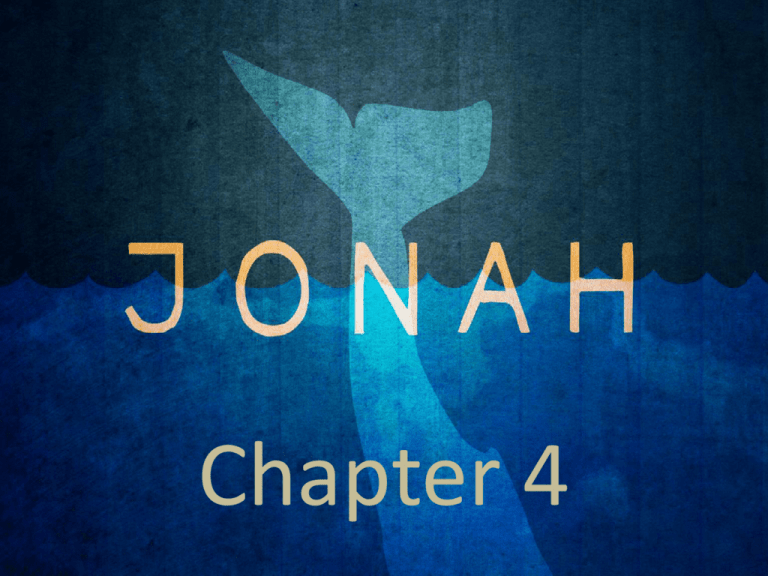
Chapter 4 The Story Of Jonah (Chapters 1-3) The Story Of Jonah (Chapters 1-3) • God calls the prophet to go and preach to the wicked city of Nineveh. The Story Of Jonah (Chapters 1-3) • God calls the prophet to go and preach to the wicked city of Nineveh. • Jonah refuses and gets on a boat headed in the opposite direction. The Story Of Jonah (Chapters 1-3) • God calls the prophet to go and preach to the wicked city of Nineveh. • Jonah refuses and gets on a boat headed in the opposite direction. • To change Jonah’s mind, God sends a storm that threatens the boat and its crew – the sailors reluctantly throw Jonah into the sea. The Story Of Jonah (Chapters 1-3) • God calls the prophet to go and preach to the wicked city of Nineveh. • Jonah refuses and gets on a boat headed in the opposite direction. • To change Jonah’s mind, God sends a storm that threatens the boat and its crew – the sailors reluctantly throw Jonah into the sea. • God mercifully sends a great fish to swallow Jonah, sparing his life. The Story Of Jonah (Chapters 1-3) • Jonah repents and is delivered from the belly of the fish. The Story Of Jonah (Chapters 1-3) • Jonah repents and is delivered from the belly of the fish. • God again calls Jonah to go and preach to Nineveh – this time the prophet obeys. The Story Of Jonah (Chapters 1-3) • Jonah repents and is delivered from the belly of the fish. • God again calls Jonah to go and preach to Nineveh – this time the prophet obeys. • Upon hearing the prophet’s message, the city of Nineveh repents of its wickedness and God spares it from destruction. Jonah 4:1-4 Jonah 4:1-4 • The prophet’s original motive for rebelling against God is finally revealed (v. 2). Jonah 4:1-4 • The prophet’s original motive for rebelling against God is finally revealed (v. 2). • Jonah actually seems to use scripture in an attempt to justify his disobedience (Ex. 34; Num. 14; Neh. 9; Ps. 86, 103, 145; Joel 2). Jonah 4:1-4 • The prophet’s original motive for rebelling against God is finally revealed (v. 2). • Jonah actually seems to use scripture in an attempt to justify his disobedience (Ex. 34; Num. 14; Neh. 9; Ps. 86, 103, 145; Joel 2). • The problem is not due to a lack of knowledge about God – Jonah knows God’s character, but he does not like it. Jonah 4:1-4 • Jonah’s attitude demonstrates the essence of idolatry – trying to make God conform to the way we want Him to be. Jonah 4:1-4 • Jonah’s attitude demonstrates the essence of idolatry – trying to make God conform to the way we want Him to be. • We cannot expect God to be merciful to us, but then to withhold mercy from others (Mt. 5:7; Mt. 18:21-35). Jonah 4:5-8 Jonah 4:5-8 • God appoints a plant, a worm, and a wind in order to teach Jonah a lesson. Jonah 4:5-8 • God appoints a plant, a worm, and a wind in order to teach Jonah a lesson. • As long as he is comfortable, Jonah is “extremely happy.” As soon as he becomes uncomfortable, he gets angry and complains. Jonah 4:5-8 • God appoints a plant, a worm, and a wind in order to teach Jonah a lesson. • As long as he is comfortable, Jonah is “extremely happy.” As soon as he becomes uncomfortable, he gets angry and complains. • Jonah shows greater concern for selfish comforts than for the souls in Nineveh. Jonah 4:5-8 • God appoints a plant, a worm, and a wind in order to teach Jonah a lesson. • As long as he is comfortable, Jonah is “extremely happy.” As soon as he becomes uncomfortable, he gets angry and complains. • Jonah shows greater concern for selfish comforts than for the souls in Nineveh. • Nineveh forsakes its comforts to pursue God, so God gives it comfort. Jonah forsakes God to pursue his comfort, so God takes it away. Jonah 4:9-11 Jonah 4:9-11 • Jonah’s compassion is lacking because his perspective is lacking. Jonah 4:9-11 • Jonah’s compassion is lacking because his perspective is lacking. • Technically speaking, Jonah obeys God, but his heart does not match God’s heart. Psalm 51:16-17 (NRSV) “For you have no delight in sacrifice; if I were to give a burnt offering, you would not be pleased. The sacrifice acceptable to God is a broken spirit; a broken and contrite heart, O God, you will not despise.” Hosea 6:6 (ESV) “For I desire steadfast love and not sacrifice, the knowledge of God rather than burnt offerings.” Amos 5:21-24 (NASB) “I hate, I reject your festivals, nor do I delight in your solemn assemblies. Even though you offer up to Me burnt offerings and your grain offerings, I will not accept them; and I will not even look at the peace offerings of your fatlings. Take away from Me the noise of your songs; I will not even listen to the sound of your harps. But let justice roll down like waters and righteousness like an ever-flowing stream.” Micah 6:6-8 (NASB) “With what shall I come to the Lord and bow myself before the God on high? Shall I come to Him with burnt offerings, with yearling calves? Does the LORD take delight in thousands of rams, in ten thousand rivers of oil? Shall I present my firstborn for my rebellious acts, the fruit of my body for the sin of my soul? He has told you, O man, what is good; and what does the LORD require of you but to do justice, to love kindness, and to walk humbly with your God?” Jonah 4:9-11 • Jonah’s compassion is lacking because his perspective is lacking. • Technically speaking, Jonah obeys God, but his heart does not match God’s heart. • We cannot “repent” simply to avoid trouble, then go back to the way we were before. Jonah 4:9-11 • “Should I not have compassion on Nineveh?” Jonah 4:9-11 • “Should I not have compassion on Duluth?” Jonah 4:9-11 • “Should I not have compassion on Duluth?” Jonah 4:9-11 • “Should I not have compassion on Duluth?” Jonah 4:9-11 • “Should I not have compassion on Duluth?”

